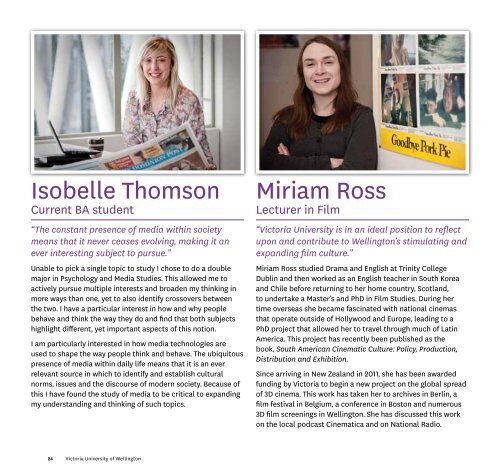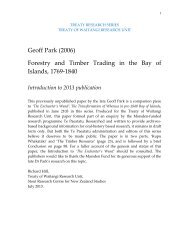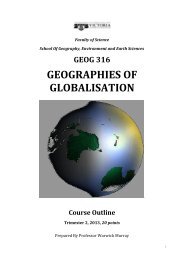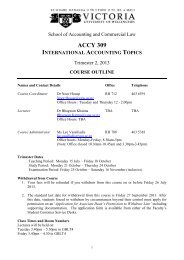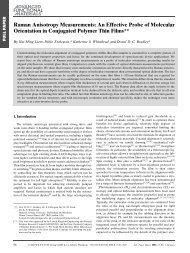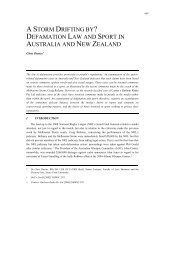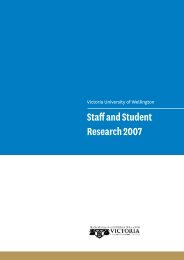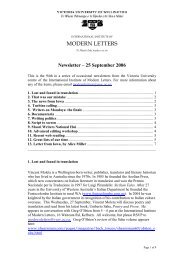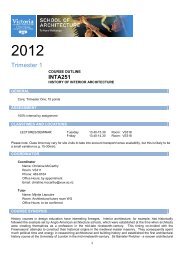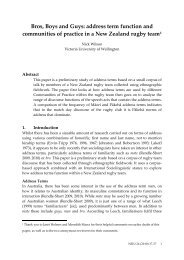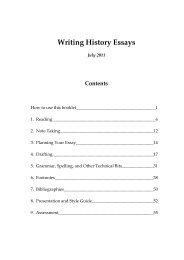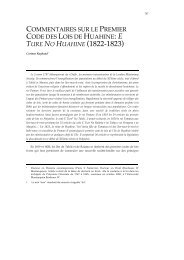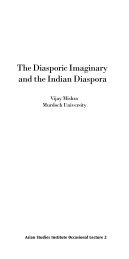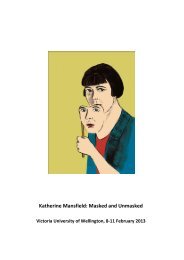Faculty oF humanities and social sciences 2013 - Victoria University ...
Faculty oF humanities and social sciences 2013 - Victoria University ...
Faculty oF humanities and social sciences 2013 - Victoria University ...
You also want an ePaper? Increase the reach of your titles
YUMPU automatically turns print PDFs into web optimized ePapers that Google loves.
Isobelle Thomson<br />
Current BA student<br />
“The constant presence of media within society<br />
means that it never ceases evolving, making it an<br />
ever interesting subject to pursue.”<br />
Unable to pick a single topic to study I chose to do a double<br />
major in Psychology <strong>and</strong> Media Studies. This allowed me to<br />
actively pursue multiple interests <strong>and</strong> broaden my thinking in<br />
more ways than one, yet to also identify crossovers between<br />
the two. I have a particular interest in how <strong>and</strong> why people<br />
behave <strong>and</strong> think the way they do <strong>and</strong> find that both subjects<br />
highlight different, yet important aspects of this notion.<br />
I am particularly interested in how media technologies are<br />
used to shape the way people think <strong>and</strong> behave. The ubiquitous<br />
presence of media within daily life means that it is an ever<br />
relevant source in which to identify <strong>and</strong> establish cultural<br />
norms, issues <strong>and</strong> the discourse of modern society. Because of<br />
this I have found the study of media to be critical to exp<strong>and</strong>ing<br />
my underst<strong>and</strong>ing <strong>and</strong> thinking of such topics.<br />
24 <strong>Victoria</strong> <strong>University</strong> of Wellington<br />
Miriam Ross<br />
Lecturer in Film<br />
“<strong>Victoria</strong> <strong>University</strong> is in an ideal position to reflect<br />
upon <strong>and</strong> contribute to Wellington’s stimulating <strong>and</strong><br />
exp<strong>and</strong>ing film culture.”<br />
Miriam Ross studied Drama <strong>and</strong> English at Trinity College<br />
Dublin <strong>and</strong> then worked as an English teacher in South Korea<br />
<strong>and</strong> Chile before returning to her home country, Scotl<strong>and</strong>,<br />
to undertake a Master’s <strong>and</strong> PhD in Film Studies. During her<br />
time overseas she became fascinated with national cinemas<br />
that operate outside of Hollywood <strong>and</strong> Europe, leading to a<br />
PhD project that allowed her to travel through much of Latin<br />
America. This project has recently been published as the<br />
book, South American Cinematic Culture: Policy, Production,<br />
Distribution <strong>and</strong> Exhibition.<br />
Since arriving in New Zeal<strong>and</strong> in 2011, she has been awarded<br />
funding by <strong>Victoria</strong> to begin a new project on the global spread<br />
of 3D cinema. This work has taken her to archives in Berlin, a<br />
film festival in Belgium, a conference in Boston <strong>and</strong> numerous<br />
3D film screenings in Wellington. She has discussed this work<br />
on the local podcast Cinematica <strong>and</strong> on National Radio.


